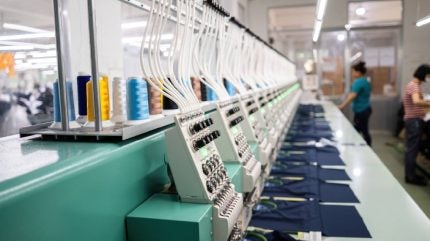
CEMATEX president Alex Zucchi said: “With this registration, the association is in a leading position to represent the European textile machinery industry in dialogue with EU legislators and to actively contribute to consultations on upcoming legislative initiatives”.
As part of these activities, CEMATEX has joined the EU Sustainable Textiles Transition Pathway, endorsing efforts towards a more sustainable European textile sector.

Discover B2B Marketing That Performs
Combine business intelligence and editorial excellence to reach engaged professionals across 36 leading media platforms.
Additionally, the organisation has become a member of the EU Textiles Ecosystem platform to ensure it remains connected and visible within the wider textiles community.
As the EU prepares its textile strategy, CEMATEX said that it is closely monitoring the main legislative initiatives that could impact the sector.
These include the Eco-Design Regulation (Textile Delegated Act), Waste Framework Directive implementation, Product Environmental Footprint Category Rules for apparel, and reforms related to market surveillance and customs, such as the proposal for a central market surveillance agency.
What’s more, the organisation is actively involved in trade advocacy, representing the interests of its members on a global stage.

US Tariffs are shifting - will you react or anticipate?
Don’t let policy changes catch you off guard. Stay proactive with real-time data and expert analysis.
By GlobalDataThe association is currently focused on addressing issues such as the Indian Omnibus Technical Regulation, which mandates compulsory certification for weaving and embroidery machines. CEMATEX has submitted a position paper to India’s Ministry of Heavy Industries and is lobbying for a postponement of the regulation.
In Europe, CEMATEX has worked with other EU industry associations, including CECIMO, Orgalim, and the Committee of European Construction Equipment (CECE), to urge the European Commission (EC) to reject mandatory certification for CE-marked machinery.
At the World Trade Organization plenary meeting in June 2025, the organisation had called on the EC to recognise this requirement as a Technical Barrier to Trade (TBT) and to seek its removal.
Moreover, the organisation is lobbying for tariff-free access for EU textile machinery exports to India, aiming to enhance market opportunities for European manufacturers.
Regarding market surveillance, CEMATEX advocates for stronger enforcement against non-compliant imports. It has issued a position paper to EU Member State Market Surveillance Authorities and initiated a support plan that includes documentation to assist MSAs and customs authorities in identifying potential non-compliance in imported textile machinery.
A specialist Machine Safety Committee has been formed within CEMATEX, comprising experts from member companies. This committee will gather evidence of recurring non-compliance issues and develop resources such as brochures to aid MSA and customs inspections.
Awareness campaigns are also being prepared to inform customer associations and trade unions about risks associated with non-compliant imports.
Through these initiatives, CEMATEX aims to reinforce its leadership role in representing European textile machinery interests.
“By engaging in EU decision-making and defending industry interests in global trade, CEMATEX is committed to ensuring a competitive, sustainable, and innovative future for the European textile machinery industry,” Zucchi added.





